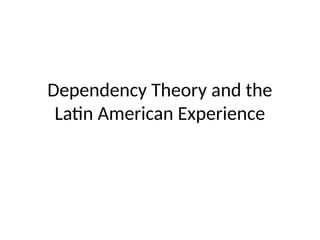
Dependency_Theory_and_the_Latin_American_Experience.ppt.pdf
- 1. Dependency Theory and the Latin American Experience
- 2. • 1500’s – European explorers spread throughout the Americas, Africa and Asia claiming land or Europe. • 1900’s – The United states soon sprawled out through the North America and took control of Haiti, Puerto Rico, Guam, the Philippines, the Hawaiian Islands and parts of Panama and Cuba.
- 3. • With colonialism came the exploitation of both natural and human resources. • The Transatlantic slave trade followed a triangular route between Africa, the American and Carribean colonies, and Europe. • The colonial model kept going strong. – In 1870, only 10% of Africa was colonized. By 1940 , only Ethiopa and Liberia were not colonized.
- 4. • Under this colonial regime, European countries took control of land and raw materials to funnel wealth back to the west. • Most colonies lasted until the 1960’s and the last British colon, Hongkong was finally granted independence in 1997.
- 5. After the Second World War, • Why are so many countries in the world not developing? • Traditional answer : because these countries are not pursuing the right economic policies or their government are authoritarian and corrupt. • Latin Americans were critical of this answer and are intrigued by their regions development which lead to the conceptualization of the Dependency theory.
- 6. Dependency Theory • Dependency is the condition in which the development of the nation-states of the South contributed to a decline in their independence and to an increase in economic development of the countries of the North. • It argues that liberal trade (free trade) causes greater impoverishment, not economic improvement to less developed countries.
- 7. Dependency theory • Moreover, it sees trade protectionism through import substitution as the key to self-sustaining path to development not liberal trade or export. • It also focuses on how poor countries have been wronged by richer nations. • It argues that in a world of finite resources, we cannot understand why rich nations are rich without realizing that those riches came at the expense of another country being poor. • Global stratification starts with colonialism, in this view.
- 8. Dependency theory • It was initially developed by Hans Singer and Raul Prebisch in the 1950’s Two main sub theories: • North American Neo-Marxist Approach • Latin American structuralist Approach
- 9. Dependency theory • Peripheral nations are counties that are less developed and receive an unequal distribution of the world’s wealth. • Core countries on the other hand are more industrialized nations who receive the majority of the worlds wealth.
- 10. Its major assumptions • Although generally divided into core or periphery, dependency theorist recognize that there are a number of different kind of states in the world. • Even after de-colonization, there are still important ties between the developed and less developed countries, which mainly consists in the exploitation of peripheral natural resources and workforce by the center. (Anton, 2006, p.2)
- 11. • It argues that the development of peripheral nations is stagnant because of the exploitative nature of the core nations. • Less developed countries are said to primarily serve the interests of wealthier countries and end up having little to no resources to put toward their own development.
- 12. Economies of periphery rely on manual labor and to the export of raw materials to core nations Economies of core nations process these raw materials and sell them back for higher price to Periphery nations. Some countries were not developing because the international system was preventing them from doing so.
- 13. North American Neo-Marxist Approach • Its proponent Andre Gunder Frank (1969) argued against the idea that less developed countries would develop by following the path taken by less developed countries. • As the path taken by the developed countries does not guarantee the same fate for the underdeveloped countries.
- 14. • Frank also rejected the idea that internal sources/ problems cause a country’s underdevelopment. • Rather, it is their dependency to capitalist system that causes lack of development.
- 15. Latin American structuralist Approach • Palma (1978) noted that the main reason for Latin American’s underdevelopment was the excessive reliance on exports of primary commodities (agricultural products and food) which were the object of changing process and a downward trend in the relative value in the long term.
- 16. • As a result of the influence of structuralist approach, most Latin American countries adopted strategies to achieve autonomous and self-sustaining development. • By diversifying exports, accelerating industrialization through import substitution, erecting High tariff walls – which reduced the regions dependence on foreign goods and thus, the developed North.
- 17. Historical-structural Approach • Cardoso and Faletto argues that dependency is not a general theory of underdevelopment but a methodology for the analysis of concrete situations of dependency. • Cardoso and Faletto believed that Latin American economies were the results of capitalist expansion in the United States and Europe. • This approach did not just focus on the asymmetrical relations between countries but also among groups and classes both between and within nation.
- 18. • What differentiates it form other approaches is: “the identification of interest networks – business, technocrats, the military, the middle class – that bind the dynamics of local political and economic processes to material and political interests in the industrialized world. • It saw development as historically open-ended and allowed for the possibility that the nature of dependent relations could change over time.